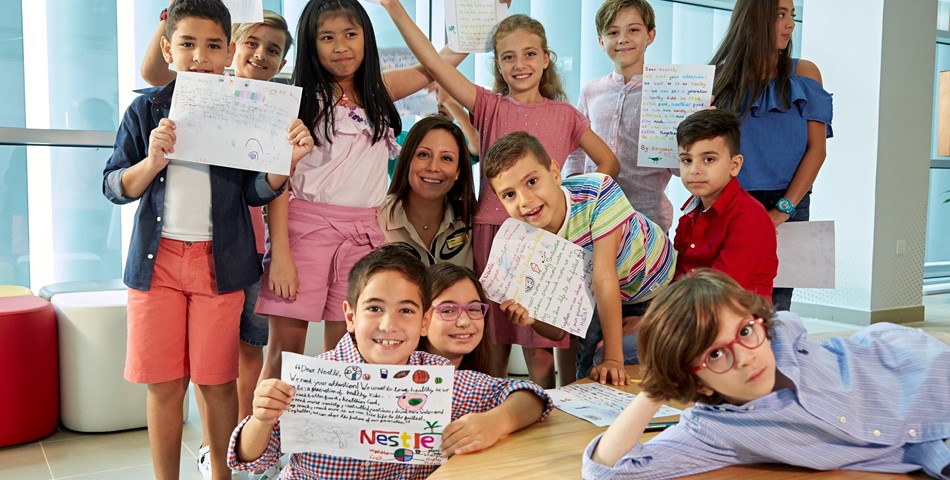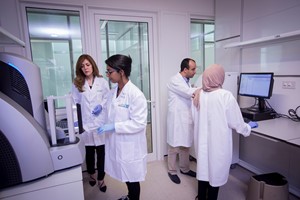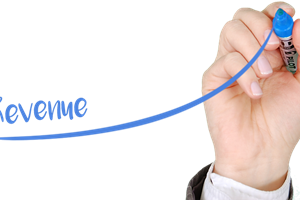The World Health Organization reports the number of overweight or obese infants and children under 5 years old to have increased from 32 million globally in 1990 to 41 million in 2016.
The WHO confirms that, “without intervention, obese infants and young children will likely continue to be obese during childhood, adolescence and adulthood.”
It also asserts “obesity in childhood is associated with a wide range of serious health complications and an increased risk of premature onset of illnesses, including diabetes and heart disease.”
Tackling this growing global issue requires collaboration between parents, schools, public entities, and the private sector to work towards achieving the United Nations' Sustainable Development Goals, which include improving overall health.
Governments in the Middle East have encouraged all entities to work together to help create healthier environments and offer better food options to encourage children to lead healthier lives.
We believe that we and other private sector companies have a role to play in contributing to this endeavor, which we do through voluntary initiatives. We at Nestlé have organized those under the umbrella of the “Nestlé for Healthier Kids” initiative that now encompasses all our efforts to support parents and caregivers on their journey to raise healthier kids.
We rely on science by Building, Sharing and Applying nutritional knowledge, so we better understand nutritional needs in communities. This is done by conducting research such as our Feeding Infants & Toddlers (FITS) and Kids Nutrition & Health (KIDS) studies with the aim of tackling particular requirements of children in the Middle East.
We continuously evolve our portfolio to Offer Tastier and Healthier Food and Beverage Choices, launching at least three reformulated products every year across the region to meet the various eating needs of children at breakfast, lunch, dinner, and snack times.
We are also reducing salt, sugars, saturated fats, and adding nutritious ingredients like fiber-rich grains or vegetables and increasing micronutrient fortification to our products, while ensuring creative product recipes, with natural ingredients typically found in a kitchen cupboard, maintain the great taste that people are accustomed to and love.
Equipped with research findings and product reformulations offering healthier eating options, we simultaneously work to Inspire Families to Raise Healthier Kids through school and community programs.
Since 2010, these have included the American University of Beirut-developed “Nestlé Ajyal Salima” nutrition education program, first launched in Lebanon and backed over the years by evidence-based results showing enrolled 9-11 year-old children eat fruits and vegetables twice more frequently and their general nutrition awareness increases significantly following its interventions.
Ajyal Salima became a part of the Lebanese Ministry of Education school health unit curriculum in 2014, expanded to Jordan in 2015 in partnership with the Royal Health Awareness Society, and to Palestine in partnership with the Ministry of Education and Higher Education in 2016 - so far reaching over 90,000 kids in the region.
Nestlé for Healthier Kids programs in the Middle East also include the “Adopt a Fruit, Adopt a Vegetable” program, in partnership with retailers to inspire children in a creative way, to choose fruits and vegetables over unhealthy snacks, and empower parents to adopt healthier habits.
The Tummyfish storybook and phone application was also launched in 2016 to make “drinking water more fun,” offering a digital fish that swims happily when a child consumes their daily water requirements, and when they choose water over sugary beverages.
Beyond childhood obesity, it’s also about contributing to address Non-Communicable Diseases (NCDs) through collective collaborations in society. A recent example is the signing of a voluntary pledge, with the Saudi Food and Drug Authority, by members of the International Food & Beverage Alliance (IFBA) in the GCC; to reformulate and innovate products for all age groups, provide clear food labels, ensure responsible advertising and marketing to children, and promote healthy lifestyles.
“It takes a village to raise a child.” The road is no doubt long and a lot more action still needs to be taken to control and help reverse current childhood obesity rates. Collaborations and innovations in the Middle East are promising a brighter future, for today’s children and tomorrow’s adults.
Patricia El-Chammas,
Nestlé for Healthier Kids Manager
Nestlé Middle East












